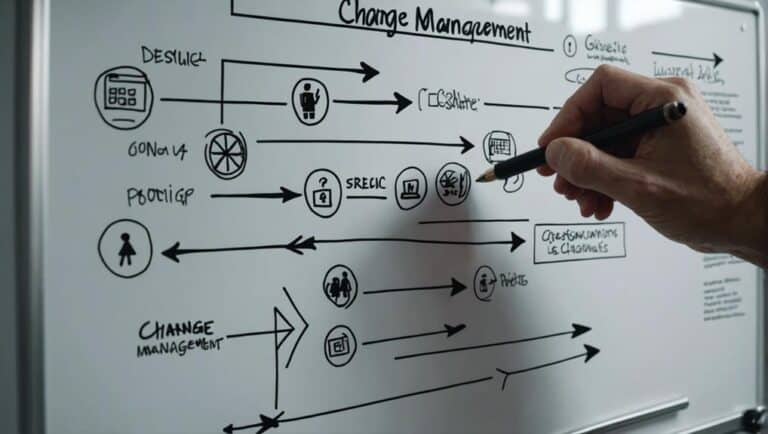Imagine yourself standing at a crossroads in your career, surrounded by a landscape of opportunities for growth and advancement. Change Management Certification Programs act as signposts, guiding you towards a path of professional development and expertise in navigating the ever-evolving world of organizational change.
As you ponder the significance of these programs, consider the doors they can unlock and the skills they can equip you with to thrive in the dynamic realm of change management.
Key Takeaways
- Validates proficiency and dedication in managing change effectively
- Aligns with industry standards like CCMP for career advancement
- Focuses on structured methodologies and frameworks like ADKAR model
- Enhances skills in stakeholder engagement and driving successful organizational transformations
Recognizing Change Management Certification Importance
Recognizing the significance of change management certification lies in its ability to substantiate your proficiency in navigating organizational transformations effectively. By obtaining a change management certification, you demonstrate your dedication to mastering the complexities of managing change within an organization. This professional qualification not only validates your experience and training in change management practices but also aligns you with industry standards, such as those offered by certification programs like CCMP. With this recognition, you open up a world of career opportunities and enhance your marketability in the industry.
Earning a change management certification requires a combination of practical experience, dedicated training hours, and successful completion of a rigorous exam. These qualifications ensure that certified professionals have the necessary skills and knowledge to lead successful change initiatives. By meeting these industry standards, you not only enhance your own capabilities but also contribute to the overall effectiveness of change management practices within your organization.
Key Elements of Change Management Programs
To gain a comprehensive understanding of change management programs, it's essential to explore the key elements that contribute to their effectiveness in driving successful organizational transformations. Change management certifications, such as the Certified Change Management Professional (CCMP) offered by the Association of Change Management Professionals (ACMP), play a vital role in validating competencies required for leading organizational change. The CCMP certification is methodology-agnostic, ensuring that professionals possess a broad understanding of change management principles. These programs typically entail 21 hours of training to equip individuals with the necessary skills and knowledge.
Moreover, specific methodologies like the ADKAR model, often included in certifications such as Prosci, offer valuable frameworks for implementing change successfully. Understanding the intricacies of organizational change and being able to apply structured approaches is paramount in change management. By focusing on these key elements within change management programs, individuals can enhance their capabilities in driving and managing change within their organizations effectively.
Top Change Management Certification Providers
Among the prominent institutions offering top-tier change management certifications are ACMP, Prosci, IMA Worldwide, the Association for Talent Development, and the Change Management Institute.
ACMP stands out for its CCMP certification, aligning with the Standard for Change Management.
On the other hand, Prosci's certification program emphasizes the ADKAR model, a popular approach in change management.
IMA Worldwide offers the AIM Change Management Certification, focusing on the human aspect of risk within change initiatives.
The Association for Talent Development provides a certification that aims to enhance efficiency and productivity in change processes.
Lastly, the Change Management Institute offers accreditation levels based on the Change Manager Competency Model, ensuring professionals meet industry standards.
Each of these providers brings a unique perspective and methodology to the field of change management, catering to different aspects of organizational transformation.
Benefits of CCMP Certification
Obtaining CCMP Certification offers you industry recognition, opens doors to enhanced career opportunities, and signifies your expertise in change management.
This globally recognized certification validates your competencies, setting you apart in the field of organizational change.
Industry Recognition for CCMP Certification
Achieving CCMP Certification can significantly enhance your credibility and expertise in the field of change management due to its global recognition and alignment with industry standards.
When considering industry recognition for CCMP Certification, you benefit from:
- Validation of general competency in leading organizational change.
- Demonstration of commitment to effective change leadership based on the ACMP Standard for Change Management.
- Acceptance of the certification as a widely recognized credential within the industry.
Enhanced Career Opportunities
Earning CCMP certification can significantly boost your career prospects in change management, providing access to a range of enhanced opportunities and increased earning potential. With 80% of job postings in change management requiring or preferring certification, obtaining CCMP certification can open doors to a variety of job opportunities. Certified change managers also enjoy higher salaries, with an average increase of 10-20% compared to non-certified professionals.
Employers value CCMP certification, seeing certified professionals as bringing added value to their projects. Moreover, CCMP certification demonstrates expertise, boosting confidence in managing change effectively. This certification can pave the way for advancing into leadership roles, with 67% of certified professionals transitioning into higher-level positions after becoming certified.
Expertise in Change Management
To excel in the field of change management, acquiring CCMP certification showcases your specialized expertise and commitment to mastering effective change leadership practices. The CCMP certification, based on ACMP's Standard for Change Management, is globally recognized, highlighting your dedication to organizational development.
By undergoing 21 hours of change management training within 7 years, you ensure you stay updated with the latest industry practices. Additionally, the CCMP exam fee, priced at $595 for members and $745 for non-members, is a worthwhile investment in your professional growth.
With CCMP certification valid for 3 years, the maintenance details post-exam ensure you continue to refine your skills and stay at the forefront of change management strategies.
Understanding Organizational Change Management
When understanding Organizational Change Management, consider the critical components of Change Impact Assessment and Stakeholder Engagement Strategies.
Assessing the impact of change on different aspects of the organization allows for targeted planning and mitigation of potential risks.
Engaging stakeholders effectively is essential for garnering support and buy-in for change initiatives, fostering a smoother transition process.
Change Impact Assessment
Conducting a thorough Change Impact Assessment is pivotal in effectively understanding how organizational changes will influence individuals, processes, and systems within the company. This assessment involves evaluating the magnitude of change, identifying stakeholders, and assessing potential risks and benefits. It helps in developing strategies to mitigate resistance, manage communication, and ensure successful change implementation.
- By analyzing the impact of change, organizations can proactively address challenges.
- It's a structured approach that enables informed decision-making.
- The assessment assists in maximizing the benefits of the change initiative.
Stakeholder Engagement Strategies
Understanding the stakeholder landscape is paramount for successful organizational change management, ensuring alignment and garnering essential support for your initiatives. Effective stakeholder engagement involves identifying key individuals, analyzing their influence and interest, and prioritizing communication tailored to their needs. By establishing feedback mechanisms and fostering collaboration early on, you can address concerns, gain insights, and facilitate smoother change implementation. Developing specific objectives, timelines, and accountability measures within stakeholder engagement plans enhances the overall success of organizational change initiatives. Utilizing clear messaging and appropriate communication channels will help in building relationships and securing the necessary backing for your change efforts.
| Stakeholder Engagement Strategies | |
|---|---|
| Key Individuals | Identify influential stakeholders |
| Communication | Tailor messaging and utilize feedback mechanisms |
| Collaboration | Foster early collaboration and address concerns |
| Change Implementation | Develop specific objectives and accountability measures |
Essential Skills for Change Managers
To excel as a change manager, developing strong communication skills is essential for effectively conveying the reasons behind organizational change. Change managers must also possess excellent problem-solving abilities to address challenges that arise during the change process.
Understanding organizational dynamics is crucial for navigating complexities within the organization. Emotional intelligence plays a significant role in managing resistance and building rapport with stakeholders. Additionally, adaptability is key for change managers to adjust strategies based on feedback and evolving situations.
Being able to effectively manage resistance, solicit and act on feedback, and pivot change strategies accordingly are all essential skills for change managers to successfully lead organizations through periods of transformation. By honing these skills, change managers can enhance their ability to drive successful change initiatives and foster a culture of continuous improvement within the organization.
Comparison of Change Management Certifications
Comparing various change management certifications reveals distinct methodologies and costs associated with each program, providing professionals with a comprehensive overview for informed decision-making.
The CCMP certification, known for being methodology-agnostic, validates general competency in leading organizational change. The CCMP exam, comprising 150 multiple-choice questions to be completed in 3 hours at a proctored testing center, costs $595 for ACMP members and $745 for non-members, with a printed certificate issued upon passing.
On the other hand, the Prosci Change Management Certification, priced at $4,400 plus airfare, includes a 1-year subscription to the Prosci Practitioner eToolkit.
Additionally, alternative options such as Lean Change Management's Change Agent Workshop and academic institution programs focusing on real-life practical experience offer professionals diverse avenues to enhance their change management skills.
Each certification program presents unique features and costs, catering to individuals with varying preferences and requirements in the field of change management.
Impact of Change Management Training
As you explore the Impact of Change Management Training, the significant benefits of investing in such training become evident in the improved success rates of change implementations and project goals within organizations. Change management training plays a crucial role in enhancing organizational performance and ensuring successful outcomes. Consider the following key impacts:
- Increased Success Rates: Companies experience a 23% increase in successful change implementations when employees undergo change management training.
- Meeting Project Goals: Organizations with employees trained in change management are 31% more likely to meet project goals, contributing to overall project success.
- Return on Investment: Investing in change management training yields a remarkable 143% return on investment, demonstrating the value and impact of such programs.
These findings highlight the transformative effects of change management training on organizational success, employee adaptability to change, and the overall achievement of project objectives. By prioritizing employee training in change management programs, organizations can drive positive organizational impact and enhance project outcomes significantly.
Future Trends in Change Management Education
Future trends in change management education are evolving to embrace cutting-edge technologies, sustainability practices, and a heightened focus on diversity and inclusion. Change management education is adapting to incorporate emerging technologies such as AI and automation to better prepare professionals for the digital transformation landscape.
Virtual learning platforms and interactive simulations are being integrated into programs to provide hands-on experience with real-world scenarios, enhancing practical skills in managing organizational change effectively. Moreover, there's a growing emphasis on sustainability practices within change management education, aligning with the increasing importance of environmental consciousness in business operations.
Professional development in areas like diversity, equity, and inclusion is also becoming integral to change management certification programs, ensuring that future change leaders are equipped to navigate diverse work environments successfully. Collaboration with industry experts and the inclusion of case studies from global organizations further enrich the learning experience, offering insights into best practices and innovative approaches to change management within a global context.
Frequently Asked Questions
Which Certification Is Best for Change Management?
For the best change management certification, consider Prosci vs ACMP for honing change management skills, leadership in organizational change, embracing agile methods, implementing strategic change management, utilizing tools and techniques, and staying updated on trends.
Is the Change Management Specialist Certification Worth It?
Is the Change Management Specialist Certification worth it for you? It can enhance career advancement, job opportunities, and salary increase. You'll gain skill development, networking benefits, industry recognition, and a competitive edge, boosting your professional credibility and personal growth.
Is the CCMP Certification Worth It?
Feeling unsure about pursuing the CCMP certification? Consider its benefits, like global recognition and enhanced skills. With a reasonable cost and methodology flexibility, it's a strategic choice for advancing your career in change management.
What Qualifications Do You Need to Be a Change Manager?
To become a change manager, you need relevant experience, strong communication, analytical skills, leadership qualities, project management, stakeholder engagement, problem-solving abilities, organizational skills, and emotional intelligence. These qualities are essential for success in this role.
Conclusion
In conclusion, with change management certification programs, you're essentially becoming a superhero of organizational transformations.
Armed with essential skills, industry knowledge, and a CCMP certification, you're ready to conquer any change initiative thrown your way.
So go forth, fearless change manager, and lead your organization to success with confidence and expertise!





